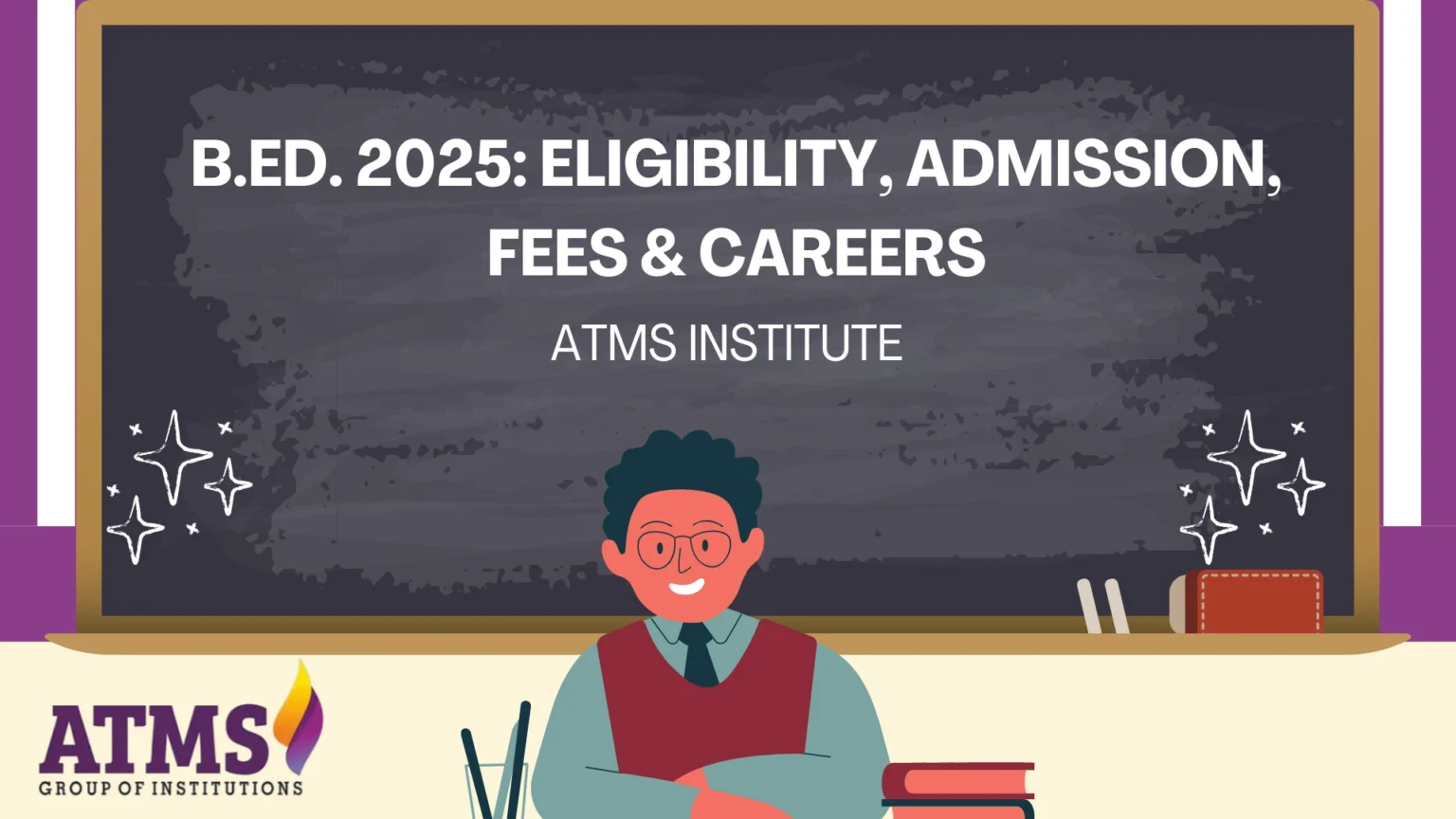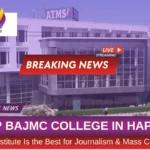Introduction: What Is B.Ed. and Why It Matters
B.Ed. (Bachelor of Education) is a professional teacher-training program that prepares graduates to become effective educators in schools, coaching institutes, and modern e-learning environments.
In simple terms, B.Ed. turns a graduate into a trained teacher by building mastery in teaching, psychology of learning, classroom management, assessment, and inclusive education.
If you’re searching for b ed course details, here’s the short version: it’s typically a 2-year program (four semesters) regulated by NCTE, offered in regular, distance, and online modes by universities and colleges across India.
The curriculum blends theory (foundations of education, teaching of school subjects) with practice (school internship, micro-teaching, lesson planning) so that you’re classroom-ready from day one.
Who Should Pursue B.Ed.?
- Graduates who want to become school teachers in primary, secondary, or senior secondary classes.
- Professionals looking to pivot into education, EdTech, curriculum design, or academic administration.
- Passionate mentors who love working with children and believe in building an inclusive, tech-enabled, and values-driven learning environment.
B.Ed. Course Details: Structure, Skills & Specializations
A strong B.Ed. program is structured to develop your knowledge, attitude, and skills as a teacher. Expect these components:
Core Learning Blocks
- Foundations of Education: History, sociology, and philosophy of education; schooling in contemporary India.
- Educational Psychology: Childhood development, motivation, learning styles, guidance and counselling.
- Pedagogy of School Subjects: How to teach Math, Science, Social Science, English/Hindi/Regional Language, Computer Science, etc.
- Assessment & Evaluation: Designing fair tests, rubrics, projects, and formative assessments.
- Inclusive & Special Education: Differentiated instruction, IEPs, and classroom accommodations.
- Educational Technology: Smart classrooms, LMS, blended learning, digital content creation.
Practical Training
- School Internship (12–20 weeks): Work like a real teacher—plan lessons, teach, maintain records, and receive mentor feedback.
- Micro-Teaching & Simulations: Practice specific teaching skills (introducing a topic, questioning, summarizing).
- Action Research/Field Work: Solve a classroom problem using simple research methods.
Semester-Wise Sample Syllabus
- Semester 1: Childhood & Growing Up; Contemporary India & Education; Language Across the Curriculum; Pedagogy of Subject I; Micro-Teaching Lab.
- Semester 2: Learning & Teaching; Assessment for Learning; Pedagogy of Subject II; ICT in Education Workshop.
- Semester 3: School Internship; School Records & Reflective Journal; Community Work/Outreach.
- Semester 4: Creating an Inclusive School; Guidance & Counselling; Gender, School and Society; Action Research Project; Viva-Voce.
Popular Specializations
- B.Ed. in Mathematics / Science / Social Science / English / Hindi / Computer Science
- B.Ed. in Special Education (popular and in demand)
- B.Ed. in Physical Education / Fine Arts (offered by select institutions)
Takeaway: The B.Ed. course builds educational depth, hands-on experience, and digital fluency—exactly what today’s schools and EdTech companies value.
Eligibility & Admission for B.Ed. 2026
Eligibility
- Educational Qualification: A bachelor’s degree (B.A./B.Sc./B.Com./B.Tech. or equivalent) from a recognized university.
- Minimum Marks: 50% aggregate for General category (relaxation—often 45%—for SC/ST/OBC/PwD as per norms).
- Age Limit: Typically no upper age limit for B.Ed. admission.
- Language Proficiency: Ability to read, write, and teach in the chosen medium (English/Hindi or regional language).
Yes—B.Ed. after graduation is the standard route; your bachelor’s discipline can be Arts, Science, Commerce, or even Engineering.
Admission 2026: Step-by-Step
- Shortlist Colleges/Universities: Ensure NCTE recognition, good faculty, internship tie-ups, and placement support.
- Check Mode: Decide between regular, distance, or online based on your schedule.
- Register Online: Most institutions accept online applications, you’ll fill the form, upload documents, and pay the fee.
- Entrance Exam (if applicable): Many states/universities conduct a entrance exam.
- Merit List & Counselling: Seats are allotted via score/merit, followed by document verification.
- Pay Fees & Enroll: Confirm your seat, choose pedagogy subjects, and begin orientation.
Important Documents
- 10th/12th and Graduation mark sheets & certificates
- ID proof, photos, signatures
- Caste/Income/Residence certificates (if applicable)
- Migration/Transfer Certificate (as required)
Entrance Pattern (Typical): MCQs on Teaching Aptitude, General Awareness, Logical Reasoning, Language Proficiency; sometimes Subject Knowledge. Pro tip: build speed with timed mock tests and read newspapers to boost language + GK.
B.Ed. Fees, Course Duration & Colleges
Course Duration
How many years is B.Ed.?
For most universities, the b ed course duration is 2 years (regular). Distance mode may offer flexibility up to 5 years for completion. Integrated pathways like B.A.-B.Ed./B.Sc.-B.Ed. are 4-year programs (great for students who decide early).
Fees: What to Expect
- Government Colleges: ~₹15,000 – ₹60,000 per year
- Private Colleges: ~₹60,000 – ₹1,50,000 per year
- Distance Mode/Open Universities: ~₹20,000 – ₹50,000 per year
Beyond tuition, budget for exam fees, books, teaching aids, travel for internships, and workshops. Scholarships, fee waivers, and state schemes may reduce b ed fees—always check the official website.
Finding B.Ed. Colleges
When you search b.ed colleges or b.ed colleges near me, evaluate:
- NCTE recognition & university affiliation
- Faculty profile & student-teacher ratio
- School internship tie-ups (government + reputed private schools)
- Infrastructure: smart classrooms, psychology lab, language lab, library, ICT lab
- Placement assistance & alumni network
- Student support: mentorship, remedial classes, seminars, clubs
Tip: Prioritize colleges that publish internship schools lists, run micro-teaching studios, and host regular teaching workshops—these directly impact your teaching confidence and employability.
Regular vs Distance vs Integrated B.Ed.
| Feature | Regular | Distance/Online | Integrated B.A./B.Sc.–B.Ed. |
| Duration | 2 Years | 2–5 Years (flexible) | 4 Years |
| Best For | Freshers seeking immersive training | Working professionals/in-service teachers | 12th-pass students sure about teaching |
| Exposure | High: daily classes + internship | Moderate: contact programs + school work | High: subject + pedagogy from year 1 |
| Outcome | Classroom-ready teacher | Balanced upskilling with job | Early career start + strong foundation |
Which to choose?
- Choose regular if you can attend full-time and want the richest practical exposure.
- Choose distance/online if you’re a working teacher or need flexibility.
- Choose integrated if you’re finishing Class 12 and are sure about teaching.
Career Opportunities After B.Ed.
Teacher Jobs (Public & Private)
- Primary Teacher (PRT), Trained Graduate Teacher (TGT), Post-Graduate Teacher (PGT) depending on your subject and further qualifications.
- Government schools typically require CTET/TET qualification; private schools highly value demo lessons + communication skills.
Roles Beyond the Classroom
- Academic Coordinator / Supervisor
- Curriculum Developer or Instructional Designer
- School Counsellor (with add-on credentials)
- Special Educator (with B.Ed. Special Education)
- Educational Content Writer / Editor
- Assessment Designer / Test Prep Trainer
EdTech & New-Age Opportunities
- Online Educator / Live Class Trainer
- Learning Experience Designer (LxD)
- YouTube/Edu-creator (courses, worksheets, doubt-solving)
- Product Specialist / Teacher Success Manager at EdTech firms
- Operations/Academic Planning roles in education startups
Your growth curve depends on CTET/TET results, communication skills, subject depth, and hands-on classroom results. With experience, many teachers move into HOD/Coordinator/VP/Principal tracks or branch out into consulting and training.
Higher Studies & Certifications
- M.Ed. (Master of Education): For leadership, research, and teacher education roles.
- MA (Education) / M.A. in your subject: For academic depth and college-level teaching (with NET/SET).
- NET/SET & Ph.D.: For higher-education and research careers.
- Add-ons: Diploma in Special Education, Guidance & Counselling, Educational Technology, TEFL/TESOL for international teaching.
Why Choose ATMS Institute for Your B.Ed. Studies
ATMS Institute stands out for its learner-centric education, robust internships, and placement-ready training—a powerful combination for aspiring teachers.
What Makes ATMS Institute a Smart Choice
- NCTE-Recognized Program: Up-to-date syllabus aligned with national standards.
- Experienced Faculty Mentors: Professors who blend research with real classroom strategies.
- Practice-First Model: Early micro-teaching, regular peer feedback, and structured school internships with reputed partner schools.
- Modern Infrastructure: Smart classrooms, ICT & language labs, psychology lab, and a well-stocked education library.
- Career & Placement Support: Resume/Demo-class coaching, interview workshops, and school drives.
- Student Support: Bridge courses, remedial help, and mentoring circles to build confidence.
- Co-Curricular Edge: Lesson-plan competitions, class management hackathons, teaching aids exhibitions, and community outreach.
Outcome you can expect: Graduates who can design engaging lesson plans, use blended learning, manage diverse classrooms, and present a polished demo lesson—the exact skill set schools and Ed Techs hire for.
Planning to join in 2026? Shortlist your subjects (e.g., English + Social Science or Math + Science), keep documents ready, and apply for B.Ed. online via the official ATMS admission portal once applications open.
Study Blueprint: How to Thrive in B.Ed.
A simple weekly plan you can adapt:
- Lesson Planning (3–4 hrs/week): Create detailed plans with objectives, activities, checks for understanding, and differentiation.
- Subject Pedagogy (3 hrs/week): Practice one pedagogy strategy (think-pair-share, concept mapping, flipped class) on a friend/classmate.
- Assessment Design (2 hrs/week): Build a mini-question bank; include MCQs, short, and application-based items.
- Reflective Journal (1 hr/week): Write what worked, what didn’t, and a small action step for next time.
- Tech Integration (1–2 hrs/week): Explore one tool weekly (e.g., Google Classroom, Kahoot, Canva for worksheets).
- Mock Demo (bi-weekly): 10–12 minutes on camera; review for voice, board work, and transitions.
Pro tips:
- Build a teaching portfolio (lesson plans, sample assessments, classroom photos—with permissions) for interviews.
- Start preparing for CTET/TET by Month 2—15–20 minutes of daily practice pays off.
- Join teacher communities; attend workshops/webinars for fresh ideas.
Conclusion: Your Roadmap to a Teaching Career
The B.Ed. (Bachelor of Education) is more than a degree—it’s a professional launchpad for a stable, meaningful, and future-proof career in education.
With a clear understanding of b ed course details, you can make informed choices and start strong.
If you want a program that balances theory, practice, and placements, ATMS Institute is a compelling choice—thanks to NCTE recognition, expert faculty, modern infrastructure, structured internships, and career support.
Shortlist your subjects, prepare your documents, and apply for B.Ed. online when applications open. Your journey from graduate to inspiring educator starts now.
FAQs & Quick Tips
1) What is B.Ed. eligibility after graduation?
Any graduate (Arts/Science/Commerce/Engineering) from a recognized university with ~50% aggregate can apply. This is the core b ed eligibility requirement.
2) How many years is B.Ed.?
The b ed course duration is generally 2 years (regular). Distance mode may allow up to 5 years. Integrated B.A./B.Sc.–B.Ed. equals 4 years after Class 12.
3) Do I need to clear CTET/TET after B.Ed.?
For most government teacher jobs, yes—CTET/TET is required. Many private schools also value it highly.
4) Can I do B.Ed. if my graduation subject is different from what I want to teach?
Usually yes, but for teaching subjects you may need related graduation coursework. Check your target university’s rules before applying.
5) Is distance B.Ed. valid?
Distance/online B.Ed. from NCTE-recognized institutions is valid. Ensure the program includes mandatory contact programs and internships.
6) What are the job options right after B.Ed.?
Teacher jobs in public/private schools, EdTech trainer, curriculum/content developer, academic coordinator, special educator (with additional specialization), and online tutor.
7) What is the salary after B.Ed.?
Salaries vary by city/board/experience. Fresh teachers often start around ₹2.5–4 LPA and can grow to ₹6–8 LPA or more with experience, certifications, and strong demo performance.
8) What subjects can I pick for teaching?
Common choices: Math, Science, Social Science, English/Hindi/Regional Language, Computer Science; availability varies by college. Choose subjects that match your graduation background and interest



